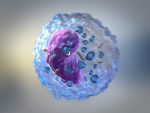Mesenchymal Stem Cells Hold Promise for Treatment, Study Review Says

Mesenchymal stem cells (MSCs), traditionally found in the bone marrow of adults, may help treat Sjögren’s syndrome by improving saliva production and decreasing inflammation, but the underlying processes of these cells need to be studied further, according to a research review.
The paper, “Treatment of Sjögren’s Syndrome with Mesenchymal Stem Cells: A Systematic Review,” was published in the International Journal of Molecular Sciences.
MSCs are a type of cell that, like other stem cells, is able to grow and differentiate into other cells (e.g., bone, cartilage, muscle, and fat cells). In addition, MSCs can coordinate the activity of other kinds of cells — most notably immune cells — by secreting chemical messengers.
Because of their immune-modulating properties, MSCs have attracted interest in recent years as a potential therapeutic strategy for Sjögren’s syndrome and other autoimmune diseases. Now, a team of researchers in France conducted a review of the available data for the use of MSCs in Sjögren’s.
In total, the team assessed 26 published studies, which reported results from MSCs isolated from different sources, including the umbilical cord, bone marrow, teeth, salivary glands, and bones. MSCs generated from mature skin cells were also examined.
Broadly, the data showed that MSCs have anti-inflammatory properties. In various models, treatment with MSCs led immune cells to secrete fewer inflammation-driving signaling molecules, such as interleukin-2 and interferon gamma, while they secreted more anti-inflammatory signaling molecules, such as interleukin-10 and transforming growth factor beta.
Data also suggest that treatment with MSCs promotes the development of regulatory T-cells (Tregs), a type of immune cell that helps to limit inflammation. MSCs also reduced the activity of pro-inflammatory T-cells and B-cells, as well as the amount of anti-SSA/Ro and anti-SSB/La autoantibodies — self-antibodies associated with Sjögren’s.
Several studies in mouse models of Sjögren’s syndrome also suggested that treatment with MSCs can increase the amount of saliva made by the salivary glands.
“All analyzed studies demonstrated physiological and cellular changes in mice and [Sjögren’s syndrome] patients after injection of MSCs,” the researchers wrote. “Indeed, there was an improvement in salivary flow, a decrease in lymphocyte [inflammatory immune cell] infiltration, and a decrease in pro-inflammatory cytokines [signaling molecules].”
However, they noted that the proposed biological mechanism for these effects was not consistent study-to-study, highlighting a need for more research.
Overall, the team concluded that MSCs “could evolve into a future therapeutic alternative” for the treatment of Sjögren’s syndrome.
“Additional clinical studies are needed to provide more powerful scientific evidence, such as long-term effects on clinical outcomes and safety, the duration of therapy, the optimal timing, and the dosages for treating [Sjögren’s syndrome],” they wrote.







